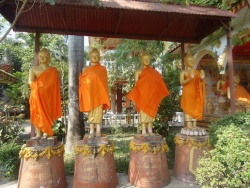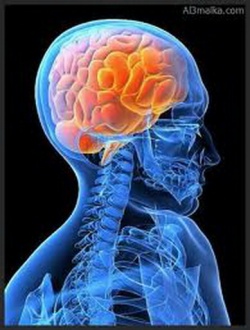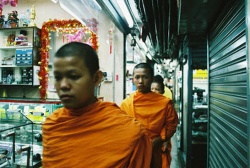Mahayana Mahaparinirvana Sutra: Chapter 21: On the Action of the Child
Mahayana Mahaparinirvana Sutra
Chapter 21: On the Action of the Child
Translated by Kosho Yamamoto from Dharmakshema's Chinese version,
edited and revised by Dr. Tony Page
Copyright for this edition is held by Dr. Tony Page, 2012.
"O good man! Why do we speak of a "child's action.” ‘O good man! A child cannot stand up, stay, come and go, or speak. This is the state of a child. It is the same with the Tathagata. We say "unable to stand up". The Tathagata does not raise any aspect of a thing. We say "unable to stay. The Tathagata does not adhere to anything. We say "unable to come. In the bodily action of the Tathagata, there is no shaking. We say "unable to go". The Tathagata already enters Great Nirvana. We say "unable to talk". He talks, but he does not speak. Why not? If spoken, that would be something of the category of the created. The Tathagata is an Uncreate. So he speaks not. Also, we say "no word". For what a child says cannot be well understood. Though there are words, they are almost no words. The case is the same with the Tathagata. The words' not being clear is the secret word of all Buddhas. Though uttered, beings do not understand. That is why we say "worldless".
"And also, with a child the name and the thing are not one. Though the child does not know the right word, it is not the case that it cannot know things. It is the same with the Tathagata. All beings differ from one another. What they say is the same. The Tathagata enacts expedients and speaks. And through this, he makes people understand. Also, a child speaks of a big letter. The same is the case with the Tathagata. He talks of a big word. This is "vaba". "Va" (i.e. the 42nd letter of the Sanskrit alphabet) corresponds to "created", and "ba" (i.e. the 36th letter of the Sanskrit alphabet) to the "non-created". This is the child. "Va" is "non-eternal", and "ba" is "eternal". Beings hear this and take it as eternal. This is the action of the child.
"Also, the child does not know suffering or bliss, day or night, father or mother. It is the same with the Bodhisattva-mahasattva. For the sake of beings, he does not see suffering or bliss. There is no difference between day and night. His mind is equal towards all beings. Hence, there is no distinction of father or mother, friendly or not friendly.
"Also, a child cannot make big or small things. It is the same with the Bodhisattva-mahasattva. Also, he does not create birth or death. This is non-making. "Big things" refers to the five deadly sins. "Small thing" refers to the two-vehicle mind. The Bodhisattva does not, right to the end, retrogress from Bodhichitta and create sravaka and pratyekabuddha vehicles.
"Also, we say "child's action". When a child cries and weeps, the parents take up the yellow leaf of bitter willow and say to the child: "Don't cry, don't cry! I shall now give you some gold!" The child sees this, thinks it is true gold, and stops crying. But this yellow leaf is in actual fact not gold. The child sees wooden cows, horses, men and women, and thinks they are men, women, etc., and stops crying. But, truth to tell, these are not men or women. As it thinks thus about men and women, we say "child". It is the same with the Tathagata. If beings are about to commit evil deeds, the Tathagata speaks about the Eternal, Bliss, Self, and the Pure, rectitude, and the freedom one enjoys in Trayastrimsa Heaven, the pleasures of the five desires which one has there in beautiful palaces, about all that obtains there, which is none but the blisses of the six sense-organs. The beings, on hearing about all the pleasure that obtains there, stop doing evil from a greedy mind, to taste the bliss and do the good that will be worth Trayastrimsa Heaven for them. Actually, there (in Trayastrimsa Heaven) there are birth and death, impermanence, non-bliss, non-Self, non-purity. To lead beings, he puts into effect an expedient and speaks of the "Eternal, Bliss, Self, and the Pure".
"Also, we say "child". If beings abhor birth and death, the Tathagata speaks of the two vehicles. But, in truth, there are not two vehicles. By "two vehicles", one sees the evils of birth and death and comes to see the bliss of Nirvana. Seeing thus, there are segregation and non-segregation, the true and the not-true, practice and non-practice, and gain and non-gain.
"O good man! Just as a child thinks of gold in regard to what is not gold, so do things stand with the Tathagata. In regard to the impure, he talks of the pure. As the Tathagata is “Paramartha-satya” itself, there is nothing false here as in the case of the child that thinks what is not a cow or horse is a cow or horse. If beings conceive of the true Way in what is not the Way, the Tathagata will also speak about this non-Way and make it into the "Way". In the non-Way, there is, truth to tell, no Way. Only as there is the smallest bit of causal relations, he talks of the non-Way and says that it is the Way. This is as with the child who thinks that the wooden man and woman are (a real) man and woman. It is the same with the Tathagata. Knowing what is no being, he speaks of a being. But truth to tell, there can be no thought of a being. If the Buddha-Tathagata says that there is no being, all beings may gain the wrong view. For this reason, the Tathagata says that beings exist. The person who entertains the thought of a being in a being cannot destroy the thought of a being. Any being who destroys the thought of a being gains Great Nirvana. When one thus gains Nirvana, one ceases crying. This is a child's action. O good man! If any man or woman upholds these five actions, reads, writes and copies and expounds (them), such a person will unfailingly gain the five actions."
Bodhisattva Kasyapa said to the Buddha: "O World-Honoured One! I now see what the Buddha says. This means that I shall unfailingly gain the five actions." The Buddha said: "O good man! It is not that you alone will gain the five actions. All of those congregated here, who are 930,000 in number, will also all-equally gain the five actions."
Continue Reading
- Mahayana Mahaparinirvana Sutra: Chapter 1: Introductory
- Mahayana Mahaparinirvana Sutra: Chapter 2: On Cunda
- Mahayana Mahaparinirvana Sutra: Chapter 3: On Grief
- Mahayana Mahaparinirvana Sutra: Chapter 4: On Long Life
- Mahayana Mahaparinirvana Sutra: Chapter 5: On the Adamantine Body
- Mahayana Mahaparinirvana Sutra: Chapter 6: On the Virtue of the Name
- Mahayana Mahaparinirvana Sutra: Chapter 7: On the Four Aspects
- Mahayana Mahaparinirvana Sutra: Chapter 8: On the Four Dependables
- Mahayana Mahaparinirvana Sutra: Chapter 9: On Wrong and Right
- Mahayana Mahaparinirvana Sutra: Chapter 10: On the Four Truths
- Mahayana Mahaparinirvana Sutra: Chapter 11: On the Four Inversions
- Mahayana Mahaparinirvana Sutra: Chapter 12: On the Tathagata-DHATU
- Mahayana Mahaparinirvana Sutra: Chapter 13: On Letters
- Mahayana Mahaparinirvana Sutra: Chapter 14: On the Parable of the Birds
- Mahayana Mahaparinirvana Sutra: Chapter 15: On the Parable of the Moon
- Mahayana Mahaparinirvana Sutra: Chapter 16: On the Bodhisattva
- Mahayana Mahaparinirvana Sutra: Chapter 17: On the Questions Raised by the Crowd
- Mahayana Mahaparinirvana Sutra: Chapter 18: On Actual Illness
- Mahayana Mahaparinirvana Sutra: Chapter 19: On Holy Actions
- Mahayana Mahaparinirvana Sutra: Chapter 20: On Pure Actions
- Mahayana Mahaparinirvana Sutra: Chapter 21: On the Action of the Child
- Mahayana Mahaparinirvana Sutra: Chapter 22: Bodhisattva Highly-Virtuous King
- Mahayana Mahaparinirvana Sutra: Chapter 23: On Bodhisattva Lion's Roar
- Mahayana Mahaparinirvana Sutra: Chapter 24: On Bodhisattva Kasyapa
- Mahayana Mahaparinirvana Sutra: Chapter 25: On Kaundinya



